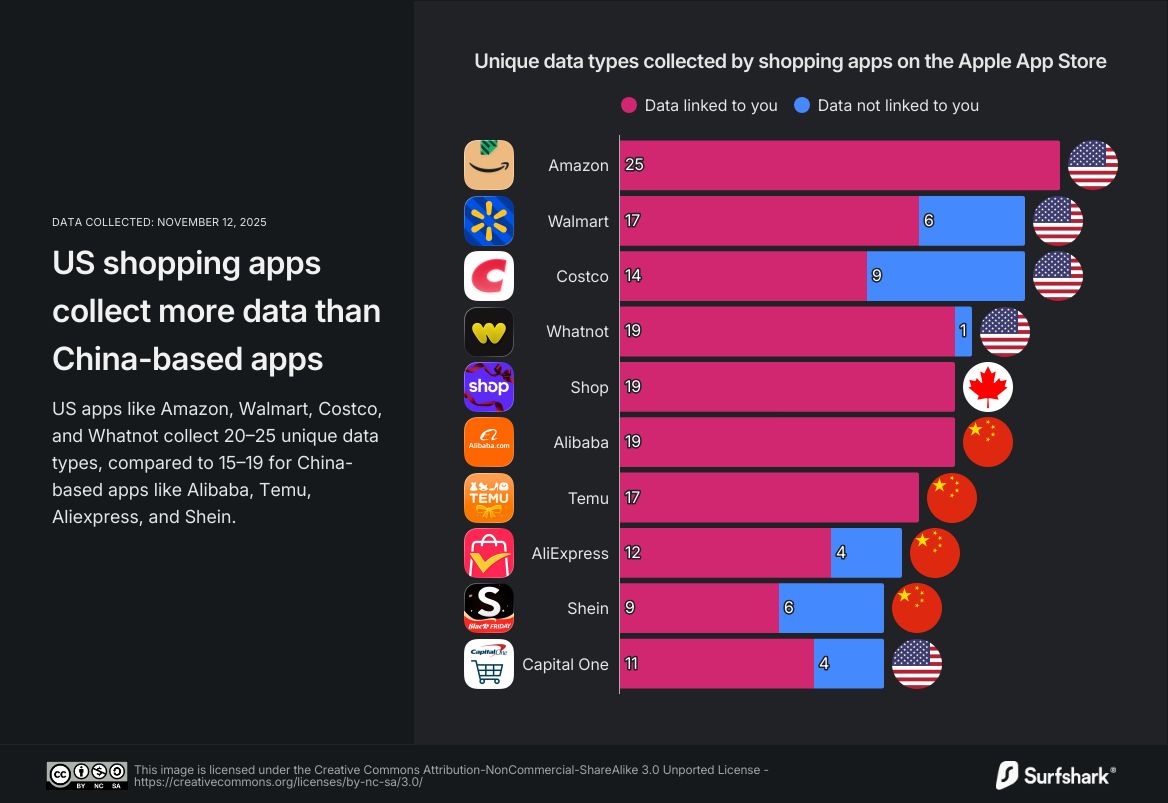- Surfshark says US apps are the real data hoarders
- Amazon leads the way and also collects users’ voices and audio.
- The data could be used to create digital replicas of users.
Browsing US shopping apps to find the best deals before the Black Friday frenzy? Then you might want to know that its reputation for data collection is dismal, surpassing even that of its often-criticized Chinese counterparts.
This is the finding of the latest research carried out by Surfshark. The cybersecurity firm examined the data collection practices of the 10 most popular shopping apps in the US and found that the four most aggressive data collectors are based in the US, surpassing Chinese competitors in the breadth of data collected.
Surprise, surprise: Amazon takes the place as the application that consumes the most datacollecting 25 unique types of data in the analyzed categories. Walmart and Costco follow with 23 each, while Whatnot collects 20. In stark contrast, China’s largest collector, Alibaba, collects “only” 19 types of data, followed by Temu with 17.
The creator of one of the best VPNs analyzed 35 different types of data collected for purposes such as product customization, third-party advertising, and data analysis. The team also assessed how many categories each app ticked by examining public information in Apple’s App Store.
All of the apps analyzed collect large amounts of users’ personal data, including payment details, ID used and search history, and most also collect phone numbers, photos and videos.
However, Only Amazon and Walmart collect information classified as “sensitive.” and that can include political opinions, ethnicity and biometric data. Along with Whatnot and Alibaba, it is disturbing to know that they could also collect voice or audio recordings.
A dangerous trade-off

Although it is reasonable to assume that Amazon, the largest marketplace in the Western world, devours an insatiable amount of data to perfect its personalization algorithms (including strictly personal data of all kinds), the results reveal a worrying potential.
And while the research itself is based on standardized categories that do not represent a uniform level of risk, the study alerts users that they may not know what type of information they are actually providing when they open an app, or where it might end up.
Surfshark warns that continuous monitoring, permanent storage of digital data, and security risks such as data leaks and breaches could expose information to malicious third parties and individuals.
Additionally, health-related data could be used in ultra-targeted advertising to exploit the most vulnerable people. “The leak of particularly sensitive data, such as political opinions or health data, can damage a person’s reputation and financial situation, since health data rarely changes and can be used by insurance companies and healthcare providers,” explains Luis Costa, research leader at Surfshark.
Shopping apps can also collect sensitive information by tracking how users interact with them, and not just when users decide to share them.
“By analyzing your searches, purchases and location, apps can learn about your interests and habits,” Costa tells TechRadar. “Sometimes they might combine this information to guess personal details like your political opinions or your health status, often to personalize your experience with the app.”
Ultimately, the more information is exposed, the easier it is to replicate anyone’s digital profile, thus putting everyone at risk, the expert warns.
How to stay safe
Your last-minute Black Friday or Christmas deal may not be worth these hidden costs.
For a more secure experience than regret, simply do not download the apps, or at least read the privacy policy and strengthen the security of your account, for example, by using two-factor authentication.
And if you’re looking for some tools to help you have more control over the data you leave online, now is the best time to do it. An early Black Friday VPN deal has already reduced the price of Surfshark One, the company’s handy security suite. Here are all the details:
Follow TechRadar on Google News and add us as a preferred source to receive news, reviews and opinions from our experts in your feeds. Be sure to click the Follow button!



